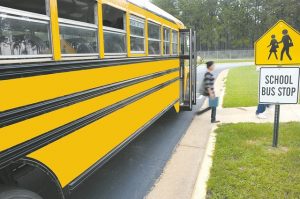As Students With Disabilities Return to School, Districts Are Unprepared to Meet Their Needs
 As students return to schools shuttered by the coronavirus pandemic, many large school districts are not prepared to meet the needs of well more than 1 million students with disabilities who have a legal right to receive support and services but are not getting them ― and the problem is most severe for students of color, according to a new report.
As students return to schools shuttered by the coronavirus pandemic, many large school districts are not prepared to meet the needs of well more than 1 million students with disabilities who have a legal right to receive support and services but are not getting them ― and the problem is most severe for students of color, according to a new report.
The crisis existed before the pandemic began in spring 2020, but was exacerbated in the past year, according to the report from the Center for Civil Rights Remedies, an initiative of the Civil Rights Project at the University of California at Los Angeles. The report authors analyzed reams of federal and state data for thousands of school districts.
About 7 million students — who constitute close to 14 percent of all K-12 public school students — are deemed eligible for special education under the requirements of the federal Individuals with Disabilities Education Act (IDEA). The law mandates that public schools provide a free and appropriate education designed to meet their individual needs through what is called Individualized Education Programs (IEP).
But, according to the report — titled Disabling Inequity: The Urgent Need for Race-Conscious Resource Remedies, and written by Losen, Paul Martinez and Grace Hae Rim Shin — there are nearly 1.4 million students with disabilities whom districts are supposed to identify and support, even though they do not necessarily require specialized instruction.
These students — whose numbers have been growing for two decades — are eligible for services under a different federal anti-discrimination law, Section 504 of the Rehabilitation Act of 1973, which protects students with disabilities who qualify for special education and those who do not.
Section 504 requires public schools to identify those students who do not require specially designed instruction, but have a disability that limits one or more major life activities and requires some services. Such a condition could be asthma or diabetes, or depression and anxiety disorders. Another example could be a student with attention-deficit/hyperactivity disorder who doesn’t need special education but does need support with organization or behavior challenges. For those students, districts are required to provide support and services to ensure that they, too, receive a free and appropriate education.
“We find strong evidence suggesting that hundreds of large districts could be failing to identify 504-only students,” the authors wrote. “Our findings show that in 3,298 districts, serving nearly 1.8 million students (1,781,962), not one 504-only student is identified. When all the districts with at least 1,000 enrolled students are examined, one can see that in 306 districts serving nearly one million students not one 504-only student is identified.”
The report also said that there are “glaring disparities” for students receiving services and support under IDEA in disciplinary exclusion, referral to law enforcement and chronic absenteeism — and that the situation is “far worse for non-White students receiving special education.”
“The purpose of providing this analysis now is to suggest that the magnitude of the inequities that students with disabilities experience is being overlooked, especially those experienced by children of color,” the authors said.
The report recommends a massive infusion of federal funding to districts, noting that in fiscal 2021, Congress allocated only $13.8 billion for the IDEA, which is about 13 percent of the total additional costs of providing education to students who need special education.
As students with disabilities return to school, districts are unprepared to meet their needs, report says” in The Washington Post. Read the full article online.
Source: The Washington Post | As students with disabilities return to school, districts are unprepared to meet their needs, report says, https://www.washingtonpost.com/education/2021/03/22/school-districts-unprepared-to-meet-need-of-returning-students-with-disabilities | © 2021 The Washington Post
If you are a parent or caregiver and would like to schedule an evaluation or get advice about your child’s challenges, call or email a CHC Care Manager at 650.688.3625 or careteam@testing.chconline.org





